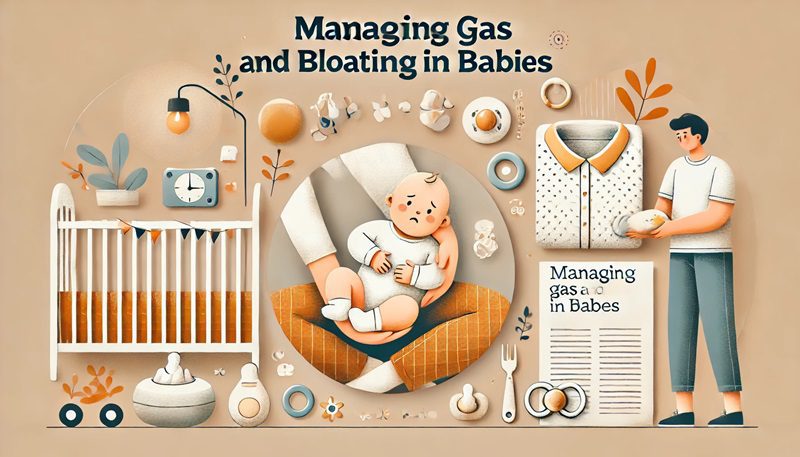Table of Contents
Managing Gas Bloating Babies
Gas and bloating are common issues that affect many babies, especially during the early months of life. As parents, it can be distressing to see your baby uncomfortable or in pain, but rest assured—there are ways to manage these situations effectively. In this article, we will explore the causes of gas and bloating in babies and share practical tips on how to soothe your little one. We’ll also introduce some helpful products from our store, specifically designed to provide relief and comfort for your baby.
Gas and bloating are common issues faced by many infants, and while they are usually harmless, they can be a source of discomfort for your little one. To help prevent or alleviate these symptoms, it’s important to understand the causes and adopt the right feeding practices. For more detailed guidance on baby digestion and feeding tips, refer to this comprehensive guide on gas and bloating in babies from Mayo Clinic, a trusted authority on infant health.
Understanding Infant Gas: How to Prevent and Treat It

Gas in babies is typically caused by swallowing air during feeding, crying, or even while sucking on a pacifier. The digestive system in newborns is still developing, which can make it harder for them to expel trapped air, leading to gas buildup and discomfort.
To prevent and treat infant gas, here are some effective strategies:
- Proper feeding techniques: Ensure your baby latches onto the breast or bottle correctly. A good latch helps minimize air intake. Consider using bottles like our Anti-Colic Baby Bottles that are designed to reduce air bubbles and gas.
- Burping your baby frequently: Burp your baby after every feeding to release any air trapped in their stomach.
- Monitor your diet (if breastfeeding): If you are breastfeeding, keep an eye on your diet, as some foods like beans, broccoli, and onions can contribute to gas in your baby.
Dealing with gas and bloating in your baby can be exhausting, especially when it impacts both their sleep and yours. As a parent, managing these disruptions while trying to balance your own rest is incredibly challenging. For tips on how to handle the fatigue that comes with these sleepless nights, check out our guide on How to Deal With Sleep Deprivation After Baby. It offers helpful strategies to keep you energized and better prepared to care for your little one, even during the most trying moments.
Signs and Symptoms of a Gassy Baby
Recognizing the signs of a gassy baby can help you take steps to provide relief before the situation worsens. Some of the common symptoms include:
- Excessive crying or fussiness
- Pulling legs up toward the tummy
- Arching of the back
- A bloated or hard belly
- Frequent passing of gas
If your baby is exhibiting any of these symptoms, they may be experiencing gas discomfort. By taking action early, you can soothe your baby and prevent further distress.
Have a Gassy Baby? What to Know About Infant Gas

If you have a gassy baby, understanding how to manage the situation is crucial. Gas and bloating can often be managed by making small changes in feeding routines and adopting techniques that ease digestion. Here are some practical methods to consider:
- Positioning during feeding: Feeding your baby in an upright position can help reduce the amount of air they swallow. Our Ergonomic Baby Feeding Pillow is perfect for ensuring a comfortable, upright feeding position that minimizes gas intake.
- Tummy time: Giving your baby regular tummy time can help relieve gas by putting gentle pressure on their tummy, which encourages gas bubbles to move through the digestive system. However, always supervise your baby during tummy time to ensure their safety.
- Infant massage: Gentle belly massages can help release trapped gas. Start at your baby’s rib cage and move downwards in a clockwise motion. A massaging oil, like our Organic Baby Massage Oil, can enhance the experience and help soothe your baby’s bloated tummy.
While gas and bloating can make your baby uncomfortable, another common issue parents face is diaper blowouts and leaks. Managing these messy situations can be just as challenging, but with the right strategies, you can minimize the chances of leaks. From ensuring the proper diaper fit to choosing highly absorbent materials, managing diaper blowouts can make your day easier and help keep your baby comfortable. For more tips, check out our guide on Managing Diaper Blowouts and Leaks and learn how to prevent these incidents effectively.
How to Soothe a Baby Distressed by Gas and Bloating?
When gas and bloating cause distress, it’s essential to take immediate steps to comfort your baby. Here’s how to soothe a baby distressed by gas and bloating:
- Apply gentle heat: A warm bath can help relax your baby’s muscles and release trapped gas. You can also try placing a warm towel or a warming pad (like our Soothing Baby Heat Pad) on your baby’s belly for a few minutes to relieve discomfort.
- Try anti-gas drops: There are over-the-counter gas relief drops available that can help break down gas bubbles. Always consult your pediatrician before giving your baby any medication, even if it’s just for gas.
- Bicycle legs: Lay your baby on their back and gently move their legs in a bicycling motion. This simple exercise can help relieve gas and move it through their digestive system more quickly.
By using these methods, you’ll likely notice a reduction in gas-related discomfort and a much happier baby. Remember, every baby is different, so it may take some time to figure out which techniques work best for your little one.
Preventing Gas in Babies: Simple Steps You Can Take

While it’s impossible to completely eliminate gas, there are several proactive steps you can take to reduce its occurrence. Here’s a quick checklist of preventative measures:
- Switch to anti-gas bottles: If bottle-feeding, opt for anti-colic or anti-gas bottles that reduce the amount of air your baby swallows. Our Anti-Colic Baby Bottles are an excellent choice for parents dealing with a gassy baby.
- Adjust your baby’s formula: Sometimes, a baby’s formula can contribute to gas. If you suspect the formula is the issue, consult your pediatrician about switching to a gentler formula that’s easier to digest.
- Avoid overfeeding: Overfeeding can cause bloating, so keep an eye on your baby’s feeding cues to know when they are full.
While managing gas and bloating in your baby can be challenging, it’s also important to be aware of other common newborn conditions that may arise. For instance, jaundice in newborns is a condition that affects many babies, typically appearing within the first few days after birth. It occurs when there is an excess of bilirubin in the blood, leading to yellowing of the skin and eyes. Understanding the Jaundice in Newborns – Symptoms, Causes, and Treatment can help you identify and manage this condition early, ensuring your baby receives the best care.
When to See a Doctor
While gas is usually not a cause for concern, if your baby’s discomfort persists or is accompanied by other symptoms like fever, vomiting, or diarrhea, it’s essential to contact your pediatrician. Gas pain that doesn’t resolve or that seems to worsen over time could indicate a more serious underlying issue that needs medical attention.
Your pediatrician may suggest dietary changes or further testing to rule out conditions like lactose intolerance or other digestive problems.
Infant Gas: How to Prevent and Treat It – A Recap

Managing infant gas doesn’t have to be overwhelming. By taking simple preventative steps and knowing how to treat gas when it occurs, you can keep your baby comfortable and happy. Ensuring proper feeding techniques, burping your baby regularly, and using the right tools, such as our Anti-Colic Baby Bottles and Ergonomic Baby Feeding Pillow, are effective ways to minimize gas.
Additionally, for babies who experience frequent gas or bloating, using massage techniques with products like our Organic Baby Massage Oil and providing a warm compress with our Soothing Baby Heat Pad can offer relief and make a significant difference in your baby’s comfort.
Have a Gassy Baby? What to Know About Infant Gas

If you find yourself asking, “Why do I have a gassy baby?”, it’s important to remember that all babies experience gas to some degree. However, following the tips outlined in this article can help reduce the frequency and severity of gas-related discomfort. Taking time to understand your baby’s specific needs and adjusting feeding habits can lead to noticeable improvements.
When in doubt, always consult with your pediatrician to ensure there’s no underlying health issue contributing to your baby’s gas.
Traveling with a baby can be challenging, especially when dealing with common issues like gas and bloating. Ensuring your little one is comfortable and has the right gear can make a huge difference. From compact strollers to portable bottle warmers, having the right essentials will ease your journey. Check out our guide on How to travel with a baby, and the gear you need to make your trip smoother and more enjoyable for both you and your baby.
Conclusion: How to Soothe a Baby Distressed by Gas and Bloating?
In conclusion, learning how to soothe a baby distressed by gas and bloating requires patience and persistence. By incorporating the right feeding techniques, massages, and using specialized products, you can ease your baby’s discomfort effectively. Don’t forget to explore our range of baby care products like the Anti-Colic Baby Bottles, Ergonomic Baby Feeding Pillow, and Organic Baby Massage Oil, all designed to help you manage your baby’s gas and bloating with ease.
No parent likes to see their baby in distress, but with the knowledge and tools shared in this article, you’ll be well-equipped to handle gas and bloating like a pro. For more tips and to shop our full range of baby products, visit our store today!

